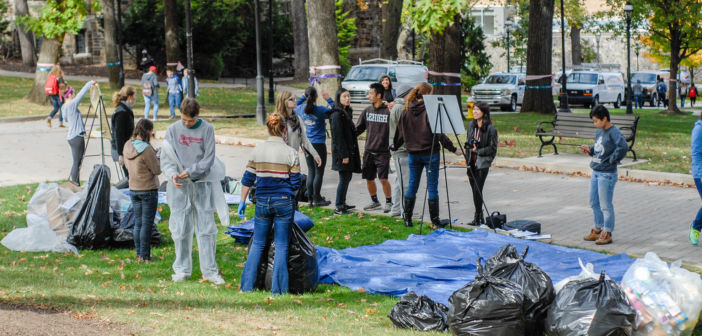What started in 1971 as a small recycling project for old newspapers in Dravo and Richards dorms, catapulted Lehigh into campus-wide efforts to improve sustainability.
Among the initiatives Lehigh has established over the years, it has instilled a more intensive recycling and waste diversion program, attempted to combat issues with students’ recycling habits and added education for those topics through the Office of Sustainability.
Gary Falasca, the director of facilities services, said the first major efforts toward recycling on campus began in 1991 for computer paper. A small group of people would place collection trays for recycling on office desks.
A September 1990 issue of The Brown and White mentions Lehigh purchasing 350 recycling bins to distribute throughout campus. Now in 2016, Lehigh has reached the point of measuring its diversion rate — the amount of waste diverted from landfills or incinerators to recycling plants.
Lehigh’s single-stream recycling rate was 25.3 percent in 2015, and its total diversion rate, which includes all forms of recycling, donated materials and composting, was 49.8 percent. For comparison, the diversion rate was 41.0 percent in 2014.
Colorado State University achieved an 83.4 percent waste diversion rate in 2015, one of the highest in the country. At a glance of a dozen peer institutions of similar size, however, Lehigh’s diversion rate is higher than the average.
Lehigh’s trash and recycling policies are mostly handled by facilities services, but Bethlehem laws shape many policies, too. Falasca said some final decisions are made by Provost Pat Farrell and Patricia Johnson, the vice president of finance and administration.
Many people involved in Lehigh’s sustainability programs believe educating the campus, specifically first-year students, on the topic is the first step in continuing to improve in the school’s sustainability.
Dana Pierce, ’18, a Greek Eco-Rep coordinator at Lehigh, said the lack of communication about what should go where often leads to problems with recycling. She thinks most of the blame falls on the students.
“They don’t know, they’re not informed, or they just don’t care, which is even worse,” Pierce said.
Paola Lopez, ’20, said she frequently sees both the trash and recycling bins overflowing with the wrong items in her dorm. Lopez, who lives in McConn in Lower Cents, said her Gryphon once texted her whole hall about making sure they put trash and recycling in the right areas.
Lopez said in her home country Nicaragua, they don’t really recycle, so she doesn’t know what items are recyclable in the U.S.
“I just feel that everyone throws everything wherever they want,” Lopez said. “So I just throw everything, even if it’s recyclable, in the waste because I’m not sure.”
Eco-Reps are aware of this issue and said they’re attempting to combat it with more programs and involvement during student orientation. Samantha Smith, ’18, a campus events coordinator for Eco-Reps, said it’s hard for first-years to buy into all the policies, but that it’s really about making it a habit.
“For some people, it’s just not part of their mindset,” Smith said. “One of my majors is environmental studies, so it’s part of what I care about, and not everyone does. So it’s about making it meaningful for them.”
Johnson said she was surprised when she came to Lehigh a few years ago and found that many offices didn’t have recycling bins. She said when she was at Cornell, every office had a bin.
She also said when Lehigh finally put bins in each office, they were asking permission to distribute them instead of just doing so, which felt strange to her. Johnson said creating the expectation of recycling is something Lehigh is continuing to strive for.
While getting students and administration to contribute to sustainability is one side of the issue, some Eco-Reps believe Lehigh’s janitorial services need to do a better job, too.
These services at Lehigh are fulfilled through ABM, a large company that does a wide variety of things such as janitorial services, electrical and energy solutions, and parking and transportation.
Clear bags are supposed to be used for recycling bins and black bags for trash, but Pierce said ABM staff members sometimes fail to use the correct bags. She said better communication between the staff and the school would lead to less waste.
“It’s really frustrating when you go into a house and all of their bags are black,” Pierce said. “They’re not even using clear bags in the recycling because there’s a disconnect there.”
ABM is responsible for picking up the bags in every building on campus and replacing them with clean bags, leaving the full ones outside of the building for pickup. Other ABM staffers drive around in trucks and pick up the bags to bring to compactors, which are located in the lower Sayre Park Village parking lot.
After ABM brings the waste to the compactors, each bag is opened to determine which compactor it should go in. Clear bags that have more than 10 percent trash are placed in the waste compactor.
Falasca said each bag has to be opened because the bags used aren’t recyclable.
“Contamination with too much trash will render a delivered load unacceptable, diverting that load to a waste facility,” Falasca wrote in an email. “To my knowledge, Lehigh has only had one load rejected since it started this program of single stream recycling.”
However, this doesn’t account for bags that were supposed to be put in the recycling compactors that ended up in the trash compactor because of contamination. There is nothing mandating students to put items in a specific receptacle, meaning clear bags meant for recycling could regularly be put in the waste compactor due to contamination.
While these issues continue to exist, Lehigh has established multiple programs to help fix them. As an Eco-Rep, Pierce goes into Greek houses once a month to give talks about proper recycling and waste removal habits.
She also helps run Greek waste audits — random days each semester in which Greek Eco-Reps climb into hazmat suits and dump out all their trash and recycling to see how sustainable the house is. Pierce said Greek houses usually end up with better results in their follow-up waste audit in the spring after they get a baseline for how they’re doing in the fall.
Katharine Targett, Lehigh’s sustainability program manager, said the school’s current diversion rates are good but that there’s always room for improvement.
“We really feel like it’s a culture change that needs to happen, and the way that we’re approaching that is we’re trying to get our Eco-Reps in as many halls as possible, but it really starts with the freshmen each year,” Targett said. “And then after four years, you have a whole campus that knows what the policies are, what works, what’s recyclable and what isn’t.”
Lehigh received a bronze STARS — sustainability tracking, assessment and rating system — rating in 2014 and a silver rating in 2015. Targett said the goal is to improve to gold next year.
The school’s Campus Sustainability Plan 2020 includes diverting all food waste from the waste stream and minimizing waste generated on campus by 10 percent on the 2010 baseline.
Targett said since the Office of Sustainability was instituted in 2010, Lehigh’s sustainability efforts have improved, and Smith said this has accelerated since Targett arrived at Lehigh a year ago.
“Maybe it’s going to be climate change, maybe it needs to be that dramatic to make a change, but we’re trying,” Smith said. “It’s a work in progress.”






Comment policy
Comments posted to The Brown and White website are reviewed by a moderator before being approved. Incendiary speech or harassing language, including comments targeted at individuals, may be deemed unacceptable and not published. Spam and other soliciting will also be declined.
The Brown and White also reserves the right to not publish entirely anonymous comments.